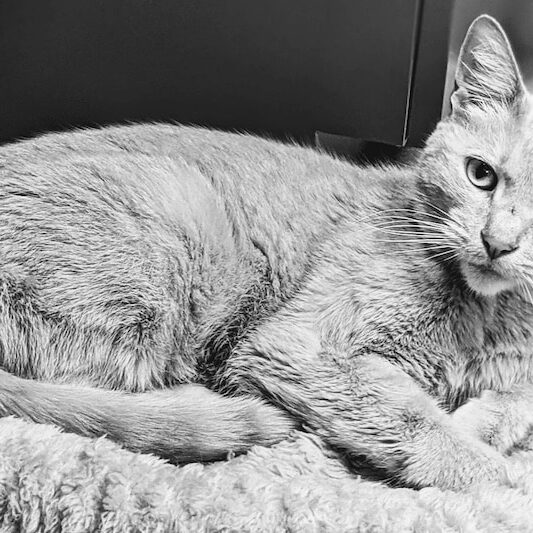Ask Dr. B
Hey Dr. B! My cat is getting regular hairballs, is that normal?

Nope! Hairballs are not normal for cats!
If your cat is getting hairballs, they are vomiting, and vomiting is never normal.
Though thought of as normal for kitties, frequent hairball production is abnormal for cats. When your cat expels a hairball, she is vomiting, and no vomiting is normal. Cats naturally consume hair during their many hours of grooming each day, and thus have evolved to allow that hair to pass undigested through the gastrointestinal tract (stomach and intestines). If your kitty only has occasional hairballs (less than 1 every 2-3 months) and is otherwise healthy (and not losing weight), there are a few hairball remedies you could try:
- Consider feeding more frequent, smaller meals throughout the day and/or feeding wet food. These changes can speed up stomach emptying and decrease buildup of fur in the stomach.
- Feed a hairball reducing diet. Though the research on these foods has been limited, they have been helpful for some cats. I recommend Hill’s Science Diet or Purina Pro Plan.
If your cat has more frequent hairballs, that could be a sign of a medical issue and even the best hairball remedy is unlikely to help. Causes of frequent hairballs include:
- Long haired cats. Cats in the wild do not naturally have long hair, and thus the domestic cat’s intestines are unable to handle the longer hair. To help your long-haired cat consider brushing weekly or even daily to remove shed hair and prevent your cat from ingesting it. A hairball diet or supplement may also be helpful. In severe cases, a “lion cut” grooming may be necessary.
- Skin disease leading to excess shedding. Skin disease, such as allergies, infections, and parasites can cause your kitty to lose more hair than normal and this buildup leads to vomiting. If you notice your cat licking, chewing or scratching frequently, please have her evaluated by a veterinarian.
- Gastrointestinal Disease. Hairballs may be an early sign of an underlying gastrointestinal disease, such as a dietary sensitivity or Inflammatory Bowel Disease. Your veterinarian can help you evaluate if this might be true for your cat and suggest a treatment plan.
While some kitties can get a free pass if they have a few hairballs every now and then, especially long-haired cats, if your kitty has a hairball more often than once monthly, I recommend discussing this with your veterinarian.
If you have a question you’d like to ask Dr. B, please send us an email.
